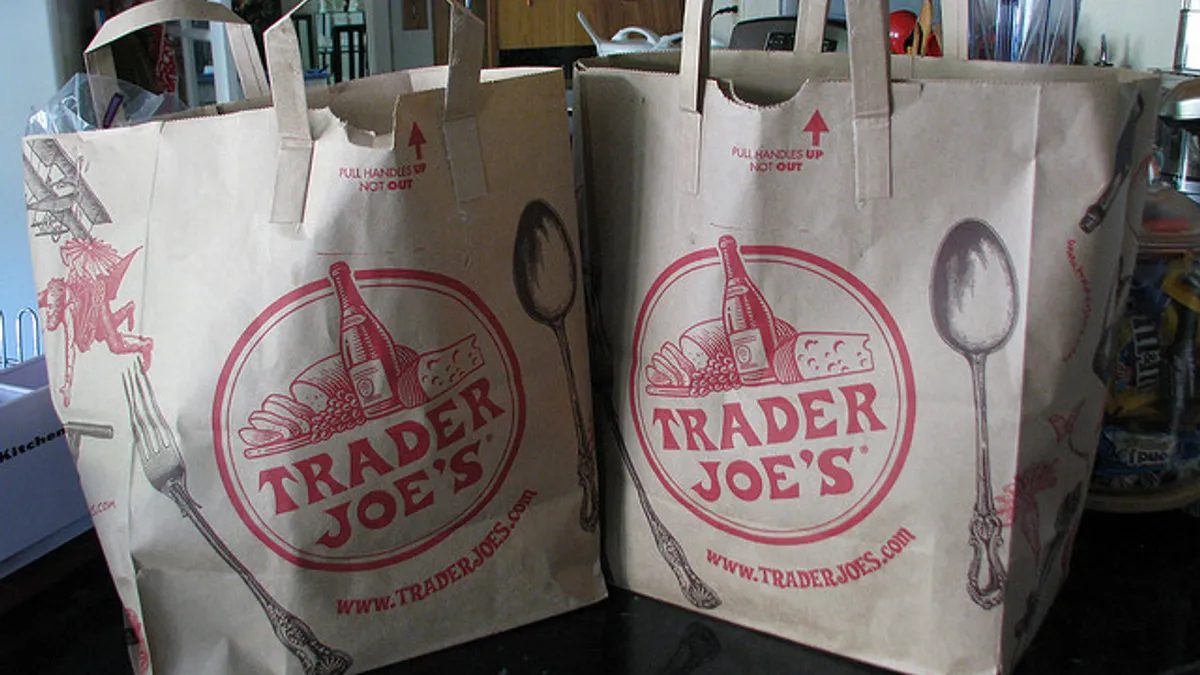Dive Brief:
-
Trader Joe's, the California-based grocery chain, announced last week that it plans to switch to thermal receipt paper that doesn't contain either of two controversial chemicals — bisphenol A and bisphenol S. BPA and BPS are considered endocrine disruptors and may cause other human health problems.
-
"We are now pursuing receipt paper that is free of phenol chemicals (including BPA and BPS), which we will be rolling out to all stores as soon as possible," Mark Sloan, Trader Joe's vice president of product marketing, said in a statement.
-
According to a study released last week by the Michigan-based Ecology Center, traces of either BPA and BPS showed up in 93% of 207 store register receipts tested. The center stated that tests were done on thermal paper receipts from Trader Joe's, Kroger, Meijer and TJX stores, along with receipts from gas stations, theaters, libraries, small and independent businesses and others. The center sent a letter to Trader Joe's with the results, and the company's announcement was posted the same day.
Dive Insight:
Bisphenol A started creating controversy several years ago after research linked it to health hazards. Manufacturers responded by committing to switch to BPA alternatives. In July 2015, ConAgra announced it had updated all of its U.S. and Canadian facilities to use only BPA-free packaging. In 2016, both Campbell and Del Monte committed to a 100% phase-out of BPA in their operations.
The chemical is commonly found in the polycarbonate plastics and epoxy resins used in plastic bottles and metal can linings. Besides point-of-sale receipts, thermal paper — which easily discolors when scratched, is quite thin and typically has a slick feel or sheen finish — is also used for airline boarding passes and luggage tags.
While BPA use is approved by the Food and Drug Administration — although FDA did ban its use in baby bottles and sippy cups in 2012 — recent research has indicated that BPA may leach from food and beverage packaging into the products people consume.
However, BPS, commonly used to replace BPA, isn't much better, according to recent studies reported by CNN. Texas researchers found that as little as one part per trillion of BPS could interfere with the normal functioning of a cell. And a Canadian study of zebrafish found BPS accelerated neural cell growth by 240% for fish exposed to extremely low levels.
While the potential health risk is highest for cashiers, wait staff, librarians and anyone who regularly handles paper receipts, the general public is advised to limit contact with the receipts as much as possible. The Minnesota Pollution Control Agency has posted a page with FAQs about the chemicals and recommendations about how to identify such receipts.
"We now know that thermal receipt paper, used widely every day, is another way that BPA gets into us," the agency said. "Studies have shown cashiers have higher levels of BPA in their body fluids than other occupations. Regular receipt handling may be of particular concern to pregnant or nursing women or women of childbearing age and adolescents of both sexes who are still developing."
Changing to receipt paper without BPA or BPS is a demonstration that a retailer is willing to respond to customer and worker concerns. In 2014, PCC Community Markets, a large natural foods retail cooperative in the Seattle area, switched to receipt paper made without BPA or BPS. The company noted that it would have to print receipts on one side only, but felt that "longer receipts but safer ones" were worth the investment.
Other retailers have also taken that route, The New York Post reported. According to the Ecology Center test results, receipts from Best Buy, the consumer electronics chain, contained Pergafast 201, which is a BPA and BPS replacement that reportedly doesn't present the same health issues that the phenols do. While some of these alternative thermal papers are more expensive than those coated with BPA or BPS, they may also have a higher print quality.
The move by Trader Joe's is another indicator of why it was recently ranked as one of the nation's top grocery chains. The report assessed 59 grocers and surveyed 11,000 customers, looking at criteria such as price, quality and value. Showing an interest in employee and public health, being upfront about why and quickly taking action about a problem can now be added to that list.








